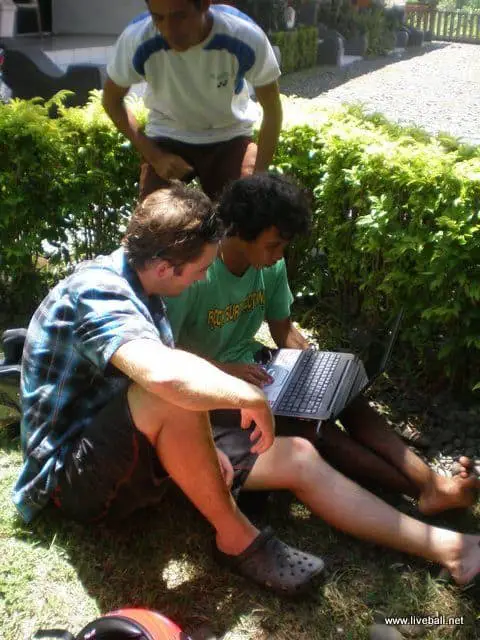11 Ways Surfing CAN Be a Job (Even for You!)
Surfing is one of the best and most enjoyable hobbies that you can possibly do, and far more fun than most people’s day jobs!
That said, some keen surfers look to turn their passion for surfing into a career and wonder how it can be done.
With this in mind, in this article I will go through every way that surfing can be a job, including 11 different options that could help you or others to make a career out of surfing.
Some of these very much depend on your current position, but they are not all about being a good surfer, as you will see below!
Pro Surfer
The first And most obvious option is that of becoming a professional or pro surfer. I know – this route is not possible for 99.99% of us, but it is the first and most obvious one.
If you are looking more for career paths for the everyday surfer, then skip to the sections below, otherwise, if you are wondering how surfers make a living, here’s a bit more on being a pro surfer!
Do professional surfers get paid?
Yes, professional surfers do indeed get paid in 2 main ways:
- Prize money from competitions: At the highest level, this is currently $100,000 for first place in World Surf League events. However, in the lower levels or amateur areas, the money is a lot less.
- Sponsorships from brands: Surf brands and other lifestyle brands pay surfers who are good enough to be featured in magazines and videos, or who have a strong social media presence. In essence, brands pay surfers for advertising space on a surfboard. Surfers put stickers on their board with their brand sponsors’ logos and these are then visible in any clips or photos of that surfer.
As with all industries at the moment, the nature of sponsorship and brand deals for Surfers is changing, as we’ll look at in a section below.
Free Surfer + Social Media Influencer/Vlogger
In the 90s and early 2000s, excellent surface who did not like competing had the option to become a ‘free surfer’.
This was only possible if they already had sponsorships and could surf at the very highest level.
Because of the nature of surfing, free surfers could have sponsorships and still feature in magazines and promote brand and awareness around them, as well as being in surf DVDs or videos in the early days.
However, with the boom in social media and platforms like YouTube and Instagram, the surf industry is also following the social media influencer route.
This means surfers who have large social followings can broker deals with various brands and earn commissions by featuring their products on their social channels.
Perhaps the most well-known surf ‘influencer’ at the moment is Jamie O’Brien, who has hundreds of thousands of YouTube subscribers at the time of writing from putting out his popular vlogs of surfing and every week.
Jamie O’Brien has been a professional surfer for many years and is known as one of the best surfers of all time at Hawaii’s famous Banzai Pipeline, so he surfs at a professional level while also having loads of fun.
He also adds to his income by having his own merch and branded items, which he features in his channel.
Another notable surf influencer is Ben Gravy, who has a very popular and active YouTube channel following his surfing exploits and travels.
Although Ben gravy is a very good surfing, he has made a name for himself from surfing everyday waves and documenting it on camera.
As he has mentioned in his videos, he wanted to be a pro surfer but it didn’t quite work out, and so he decided to make videos to share his love of surfing, primarily on YouTube.
He now has brand deals with several brands, including Sector 9 who have released the very popular ‘Semi-Pro’ Ben Gravy longboard skateboard range as a light-hearted nod to Ben Gravy’s status.
Surfboard Shaper
For those who like making things and crafts, becoming a surfboard shaper is an option for a career in surfing.
If you are wondering how much do shapers earn per hour, the answer is not much more than a minimum wage when hand-crafting and making boards since it is a competitive and highly labor-intensive job. That said, there are branch-out options for surf shapers these days, as I’ll explain below.
Surfboard design and shaping is increasingly being done by computers, namely through Computer Aided Design or ‘CAD’ software.
With shapers using CAD software, this has allowed them to design boards digitally and ship the construction out to different parts of the world where the labor is cheaper.
Places like Thailand and China are now home to many large manufacturing operations of big surfboard brands, with the option for shapers to do less of the work.
That said, there is still an industry for hand-crafted surfboards by a local shaper, with many surfers saying that they can tell the difference between a board shaped by hand versus that of a machine.
However, it’s worth noting that being a surfboard shaper involves working in dusty environments with lots of chemicals, so it’s worth researching the potential long-term health effects of such an environment before getting involved.
Surf Instructor
Being a surf instructor is another option for making surfing into your day job and, of all on this list, is likely the most achievable for many.
To become a qualified surf instructor, you need to:
- Be able to perform intermediate maneuvers in the surf like a cut back and bottom turn
- Take a surf-lifesaving course in first aid
- Pass the physical test to prove your fitness
- Run through a mock practice session with learners, giving appropriate feedback and advice
Provided that you are already good enough to pass the surf maneuvers test yourself, then the process takes about 3 months in total to complete.
Once qualified, surf instructors have the option to work for an existing surf school, of which there are many, or set one up themselves.
However, note that the above varies by country and you should be aware that some countries will do things differently to the above.
To find out more about this kind of job, simply google ‘becoming a surf instructor in [+ YOUR COUNTRY/STATE]’ and you will soon see what is required.
Surf Tour Guide
This is something that is becoming more and more available as surfing develops as a fully fledged global tourism option.
Surf tour guides obviously need a good knowledge of the local area and can make a living by showing around visiting surfers.
Some surf tour guides will also combine this with surf lessons, being a natural option when catering for complete beginners.
Most surf camps offer this as part of their ‘inclusive’ holiday packages so, if you become a surf instructor and want to ‘extend’ your stay at a surf destination, speaking to the local surf camp owners and instructors could be a great way to find out more.
Just remember to be respectful of the locals (even if you are one!) as showing up with large groups of novice surfers only works at certain break.

Surf Brand Representative
A more open role or career for many surfers might be that of a surf brand representative or ‘sales rep’.
Reps, as they are often called, have plenty of travel and are usually based in key surf locations around the world to work with the main surf brands and be part of the industry.
These jobs pay quite well but obviously mean a lot of travel and plenty of potential ‘anti-social’ hours.
That said, if you are suited to the traveling work life and feel knowledgeable enough about sports brands, apparel or other products, this is a viable career option, regardless of your level of surfing.
However, being a good surfer will also mean that you have a good awareness of hardware and products, so expect a better level of surfing to be an advantage here.
Surf Store Sales Assistant/Owner
Perhaps the most likely surf career option on this list is that of the surf store worker or owner.
Taking surf store sales assistant first, just about anyone who has a local surf store can do this.
Yes, you might need a bit of retail experience but really, it’s not something that
The future for this might be more focused on working in warehouses with big online distributions but there’s definitely still always going to be a place for local surf stores.
To go one up from there, you could also look into becoming a surf store owner. Obviously, this requires some cash to get started but you could certainly look into this as a long-term option if this kind of work appeals.
Again, whichever of the two surf careers you think best suits you, make sure your chosen venture has an online aspect to it as we all know that online shopping is becoming more and more a part of how we shop and live.
Surf Judge
Now, this one is probably the hardest to make a living out of on this list, but there are a lucky few people around the world who do get to judge surf competitions and get paid to do it.
The reason why I say it’s probably the hardest is because there are so few paid opportunities for surf judges.
Outside of the World Surf League, with its judging panel, there are very few judges in surfing who earn money from it.
In fact, most judges in surfing competitions do it for free or for a nominal fee.
However, with the advent of surfing wave pools, you may find that judging gets you a free slot, which can be worth a lot more than it sounds, especially if you land one a Kelly Slater’s Surf Ranch!
Surf Camp Worker/Owner
To add to more of the surf tourism theme, working at a surf camp can be a good option. By nature, these camps will be in surf areas, meaning waves on your doorstep.
The types of jobs at these surf camps could be anything from surf instructor to cook or anything in between.
You may also see the opportunity to set up a surf camp/resort yourself, in which case it can be a fully fledged business of your own.
Again, this requires some planning and thought but the opportunity may be there for you to yet again make surfing your job!
Surf Journalist or Photographer
If you have an enthusiasm for language and writing, then going into surf journalism might be one option for you.
There are many surf magazines around the world but, these days, chances are that you would end up writing for an online publication of some sort, like the articles sites like Surfline or Magicseaweed publish on a regular basis.
Alternatively, you could look at a site like Upwork for freelance writers about surfing and see what is out there!
If photography is more your thing then you might like to look into options around surfing. Clearly, this requires a lot of skill, knowledge and dedication so is not one for the faint of heart, but if you have a passion and the gear, you could go for it!
An easier way to break into the surf photography field might be by publishing your photos on stock photo website like Shutterstock, although there are countless others!
Otherwise, you could hang out at your local spot with a camera and tell all the locals that you have a nice photo of them when they’re getting out, which is exactly what tons of guys in Bali do to earn a living, usually on equipment bought on credit.
They charge quite a lot and hang out at the beach but it could work for you if you have the right set up and some good sunscreen!

Surf Clip Filmer/Videographer
More and more, we are watching surf film clips online, be it on YouTube, Instagram, TikTok or elsewhere, video is a massive part of the future of the online surf industry.
In fact, all surf vloggers and influencers now have filmers and editors to be able to get their clips out to the masses, making for a sound and growing industry.
Again, high-quality gear is recommended, although you can once again start with a small investment and start putting out clips on YouTube and see where it takes you (who knows, a future surf influencer might be around the corner and watching!)
In fact, one of mine and my wife’s favorite YouTube channels features clips of pros and everyday surfers having fun out in Hawai’i, and is called Dan’s Surf Videos, with a great clip below to give you a flavor!
Remember that YouTube videos can earn advertising revenue that, if getting into the 10s of thousands of subscribers, can be a nice little earner!
Whichever of the above options you prefer, remember that is a long road and that you can only do it with hard work, dedication and countless hours so if you go for it, go hard or go home!
Related Questions
What jobs do surfers have? For most everyday surfers, working self-employed in a trade as a plumber, electrician, carpenter, etc. suits them well. Generally, keen surfers look for jobs that allow them the flexibility to drop everything and run to the beach when the waves are good, as this can happen at any time.
That said, if such a job is not an option, the next best thing is a job where there is a large amount of flexibility, allowing surfers to at least plan a chunk of time off (i.e. a day or half day) when the swell is looking good later in that week, for instance.
Who is the richest surfer? It’s hard to say but it’s likely Kelly Slater, the 11-time World Champion and undisputed GOAT of pro surfing. As a sign of net worth, Slater has recently started his own lifestyle brand, OuterKnown, as well as investing in his own wave pool (including proprietary technology), the Surf Ranch.
The technology for this wave pool could well prove to be a very good financial investment and net Slater millions of dollars in the future with the potential for licensing out the technology to other wave pools.
What is the best age to start surfing? The younger the better, but people can start at any age. Those who start surfing as kids find it most intuitive and easy, but adults of all ages can learn to surf.
The main catch is that learning to surf when you are older means developing muscle groups and movements that you have not or do not use elsewhere, so the older you do this, likely the harder it becomes, but it’s definitely doable!
For some inspiration, check out any of my articles on this topic below:


